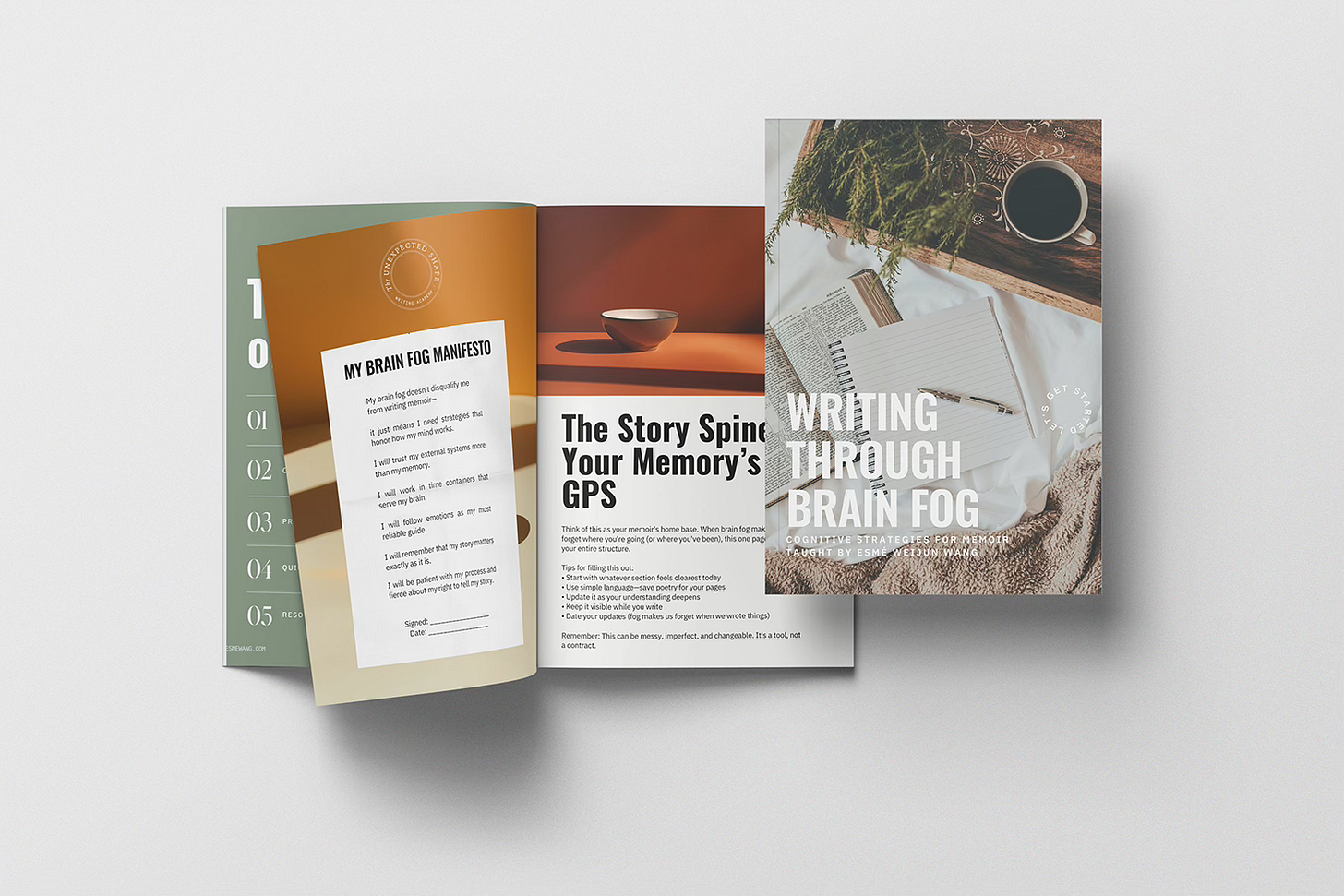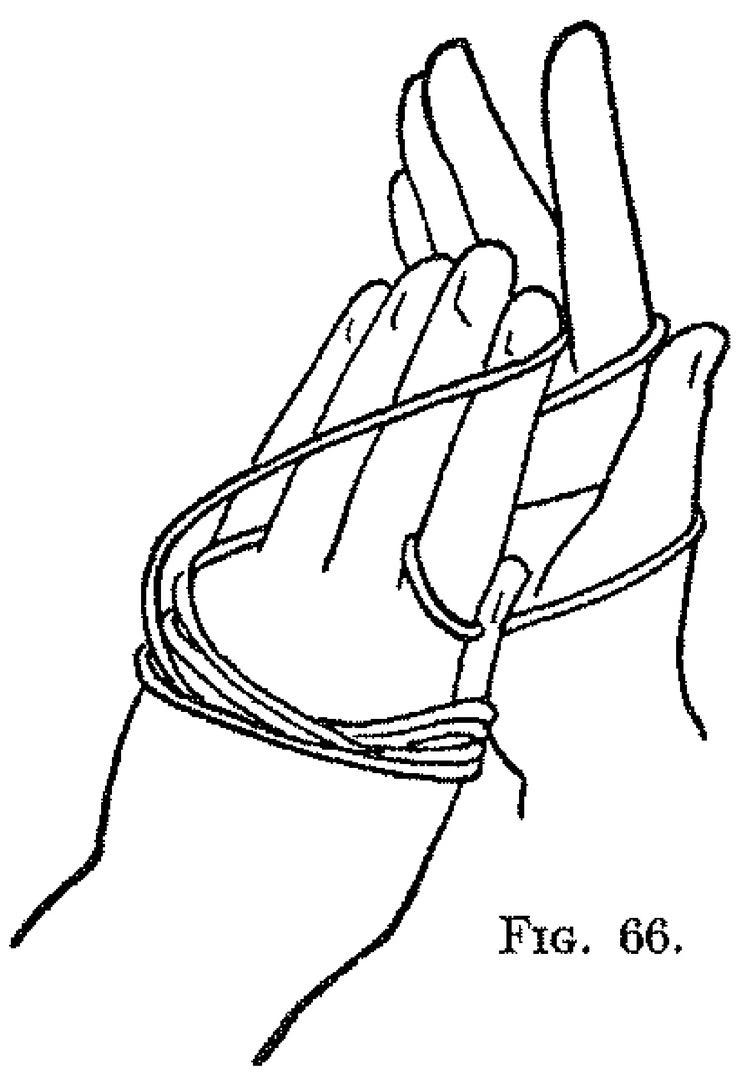When the Thread Breaks
Navigating the Difference Between Writer's Block and Brain Fog
your creative life doesn't need to look like anyone else's.
here's what i know: you're carrying stories that matter. maybe you're writing from bed today, or stealing moments between medical appointments, or wondering if your interrupted creative practice "counts."
it does. & i'm here to remind you why.
for $7/month, you're not just subscribing to another newsletter—you're joining a sanctuary where limitation becomes possibility. where we celebrate the 15-minute writing session as much as the marathon. where guest contributors like R.F. Kuang & Jenny Odell share how they navigate their own unexpected shapes and reasons for living.
as a paid subscriber, you'll receive: ✨ an ever-growing library of resources valued at $490+ (including my notion hub that will transform how you organize your writing life) 💌 the knowledge that you're directly supporting work that expands what "successful creative practice" can look like 💌 two paywalled, personal essays per month
i write for ambitious souls navigating real limitations. for those who refuse to let their circumstances define their creative worth. for you.
join us—your stories are waiting.
I know the exact day my breakthrough happened. April 1, 2025. I was working through revisions with my editor on a novel that had been brewing for six years, and suddenly—crack!—I broke through the ice. After years of feeling like I was staring at my book through cold inches on an unperturbable lake, without even a hammer with which to keep whacking away, I finally made it to the cold water beneath, to where the story was actually living.
I kept describing it to people as magic. For the first time in months, maybe years, I could see the story clearly in all its beautiful complication. My characters’ motivations were more complex. The plot threads I'd been fumbling with became woven together more artfully. I was back inside my own work, swimming in the world I'd created, rather than pressing my face against a stubborn barrier, trying to get in.
Not long after, I was in the emergency room with a burst ovarian cyst.
The physical pain was astounding. Though I've lived with chronic illness long enough to know how to navigate medical crises, I was in so much pain that I contemplated just pissing myself where I was rather than try to take the six steps to the toilet. In the end, I left—it was a full moon, after all—and my body, though exhausted, slowly began making its way back to baseline. What I didn't anticipate was how completely that ER visit would snap the fragile thread connecting me to my novel.
After weeks of recovery, when I finally felt well enough to return to my manuscript, my book had become a stranger. I could write a paragraph or two, but the novel now felt like someone I used to know intimately, but who had decided to turn their back and refused to say hello. Unlike old friends who become strangers, with whom you can usually reconnect with over coffee, my novel seemed determined to remain silent and aloof.
Forget it, it seemed to be saying. Not interested in what you have to say.
The Crucial Difference: Writer's Block vs. Brain Fog
Here's what I've learned through years of writing with chronic illness: writer's block and brain fog are not the same thing, though they're often conflated in writing advice.
Writer's block is primarily psychological. It's about fear, perfectionism, loss of trust in yourself or your story. It's the internal critic gone haywire, the imposter syndrome that whispers you're not good enough, smart enough, or talented enough to tell this story. Caroline Donahue told me that it’s a writer losing trust in themselves. Writer's block can respond to emotional and psychological interventions—therapy, creativity exercises, changing your environment, or simply pushing through the resistance.
Brain fog, on the other hand, is cognitive. It's your brain literally struggling to access the neural pathways that connect you to your creative work. Brain fog can result from chronic illness, medication changes, hormonal fluctuations, stress, sleep deprivation, or the aftermath of a significant health event.
The distinction matters because the solutions are different. You can't think your way out of brain fog the same way you might work through writer's block. Brain fog requires a more physical, neurological approach—and often, simply time for your brain to heal.
My ER visit didn't just disrupt my writing schedule. It literally scrambled the delicate neurological connections I'd finally forged with my novel. The stress, the pain medications, the disrupted sleep, the weeks of recovery—all of it created a kind of cognitive static that made it nearly impossible to access the breakthrough I'd worked so hard to achieve. I blamed myself for losing my connection to the book; what I didn’t consider was the neurological impact of my ER visit and how I might begin to slowly, slowly, slowly… approach the book again.
The Archeological Approach: Wisdom from the Writing Community
When I shared my struggle on Substack Notes, fellow writers offered insights that helped me understand I wasn't alone in this particular creative purgatory. Their suggestions, though more oriented toward writer’s block, still revealed something profound: reconnecting with "lost" work requires approaching it like an archaeological dig rather than a frontal assault.
Alexander Chee offered this gem: "Forgive yourself for being human and then look at what you left behind like someone excavating an archaeological site. Curious, interested. I print out and retype, also, which helps me."
This reframing changed everything for me. Instead of berating myself for "losing" my connection to the book, I could approach it with genuine curiosity. What artifacts had I left behind? What clues could guide me back?
Lindsey Trout Hughes shared her experience with the disconnection that "grows teeth": "On my current WIP, I had to do a lot to remember the pulse of the thing, mostly stuff that was obsessive and unstructured… playlists and Pinterest boards, designing a fake cover, writing a letter to the book asking what it wanted of me. I had to make space to court it again."
The courtship metaphor resonated. Lorraine Dolence expanded on this idea: "I try to treat the project like I'm in a courtship: thinking about it in odd moments, chatting with characters, researching something that's relevant. And usually that sense of seduction goes both ways, and I'm eventually pulled back in."
When Your Body Breaks the Creative Connection
What struck me most about the community responses was how many writers with chronic illness recognized this specific phenomenon—the way health crises can sever our creative connections in ways that feel different from ordinary writing struggles.
Katherine E. Standefer suggested treating the book as "a Being" and using body-based approaches: "If the distance with your book happened in relation to events of the body, it's quite possible the answer for mending that distance has to do with your body (energetic or physical), too."
Julie from Maps to Herself framed it in terms of nervous system care: "When this happens to me (as one w/ chronic illness) it sometimes seems like a different part of me needs love and attention. I look at creativity and art as just a natural progression of me loving myself."
This insight felt crucial. The brain fog wasn't just about accessing my manuscript—it was about my entire system needing to recalibrate after trauma.
Practical Strategies for Reconnecting Through Brain Fog
The suggestions from my writing community revealed several practical approaches that work specifically for brain fog recovery:
Start with the smallest possible entry point. Priscilla Whoolery McCormick mentioned writing haikus: "If I write a haiku, the syllable constraints work in my favor. Any small step is celebrated as valid progress."
Use alternative access methods. Hanne Blank Boyd suggested voice notes: "I walk and talk—into the voice notes app on my phone, which has a transcription feature... The talking seems to help, just being able to riff without having to write it down."
Trust that reconnection is possible, even when it doesn't feel like it. Sometimes the most important thing is simply believing that the thread can be rewoven, even if you can't see how.
The Path Forward: Honoring Your Brain's Recovery Timeline
I'm still in the process of courting my novel back. Some days, I can manage a paragraph that feels truly connected to where I was before. Other days, I focus on character sketches or research that keeps me in the story's orbit (I call it “touching” the manuscript, or “keeping one hand on the manuscript at all times”) without demanding full immersion.
What I've learned is that the neural pathways that connect us to our creative work are delicate, especially when we're managing chronic conditions. Sometimes they need time to heal just like any other part of our body.
The key insight? Brain fog isn't a character flaw or a sign that you're not a "real" writer. And yes, those are things that I’ve been thinking regularly these days.
If you're struggling with brain fog—whether from chronic illness, medication changes, stress, or health crises—know that you're not broken. Your brain is doing exactly what brains do: protecting themselves and focusing on healing. Your creative connections can be rebuilt, but it might require a different approach than traditional writing advice suggests.
Are you struggling with brain fog that's impacting your writing practice?
You're not alone, and there are specific strategies that can help. My Writing Through Brain Fog: Cognitive Strategies for Memoir class provides practical, research-based techniques for maintaining creative momentum when your cognitive resources are compromised. I’ve learned strategies from my recent experience; I’ve also been leaning on ways of working that I’ve honed over years of fibromyalgia and POTS. Interested? Learn more about the class and how to work with your brain, not against it, here.
Want more strategies for writing with limitations? Join my writing-oriented email list for weekly insights on building a sustainable creative practice that honors your real-life constraints. Sign up here for practical tips delivered to your inbox. You’ll also receive special gifts: the popular Memoir in Miniature workbook and The One-Day Writing Kickstart video class.
Ready to connect with other writers who understand these challenges? Share this post in your own Notes feed, or with a writer who might benefit from knowing they're not alone in this struggle. Sometimes the most powerful thing we can do is remind each other that our limitations don't disqualify us from creating meaningful work. ❤️
your creative life doesn't need to look like anyone else's.
here's what i know: you're carrying stories that matter. maybe you're writing from bed today, or stealing moments between medical appointments, or wondering if your interrupted creative practice "counts."
it does. & i'm here to remind you why.
for $7/month, you're not just subscribing to another newsletter—you're joining a sanctuary where limitation becomes possibility. where we celebrate the 15-minute writing session as much as the marathon. where guest contributors like R.F. Kuang & Jenny Odell share how they navigate their own unexpected shapes.
as a paid subscriber, you'll receive: ✨ an ever-growing library of resources valued at $490+ (including my notion hub that will transform how you organize your writing life) 💌 the knowledge that you're directly supporting work that expands what "successful creative practice" can look like 💌 two paywalled, personal essays per month
i write for ambitious souls navigating real limitations. for those who refuse to let their circumstances define their creative worth. for you.
join us—your stories are waiting!






Thank you for sharing this.
You, Esmé, matter even more than your writing. I’m so glad you are still here. Ruptured ovarian cysts are excruciating. You will find your way back in. 🫂💙🙏🏻
Cheering you on - this post and your care for your writing and yourself are so nourishing to read. 🥰